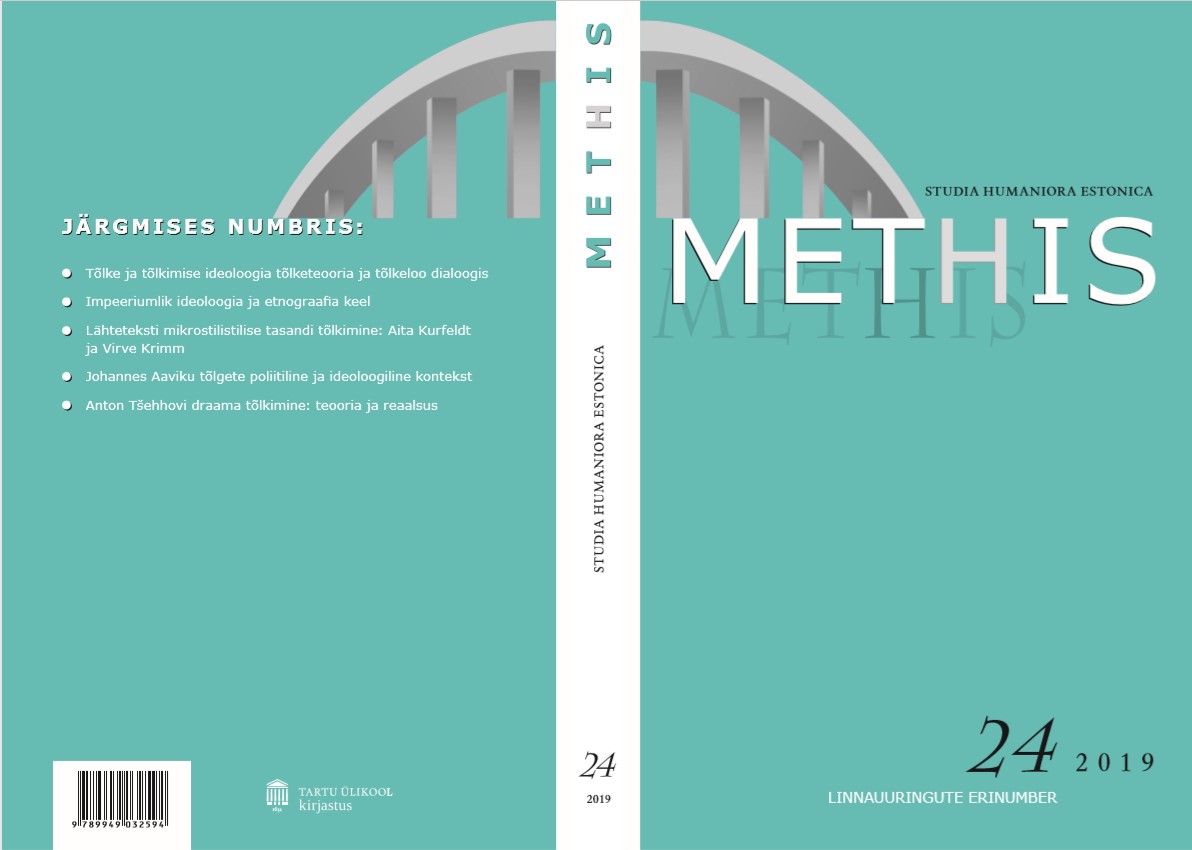Kirjanduslikest linnauuringutest / On Literary Urban Studies
DOI:
https://doi.org/10.7592/methis.v19i24.16196Keywords:
kirjanduslikud linnauuringud;, urbanism;, koht;, linnakirjandus, kirjandusteooria, Literary urban studies, urbanism, place, urban literature, literary theoryAbstract
Käesolev artikkel tutvustab kirjanduslike linnauuringute (Literary Urban Studies, LUS) uuemaid suundi, visandab olulisemad uurimismeetodid ja eristab neid teistest võimalikest käsitlusviisidest linnakultuuridele, ruumilisusele ja kehalisele kogemusele. Kirjanduslikud linnauuringud seisavad vastu varasemate linnauuringute katsetele teha üldistusi mingil hetkel kuulsaimate või suurimate linnade põhjal. Kirjanduslikud linnauuringud varustavad humanitaarteaduste uurijad vahendite, sealhulgas mõistetega, mis on rakendatavad mistahes perioodi kirjandusele ükskõik millises keeles.
In the 2010s, a new Literary Urban Studies (hereafter LUS) has developed. It combines spatial humanities scholarship with activism and other public concerns. The Association for Literary Urban Studies (ALUS) has been a key player in developing the new LUS. Publications produced by scholars connected to ALUS have been geographically wide-ranging. They have also developed interests in specific conceptual areas of LUS, including second cities and ‘citiness’, or the cultural elements that are specific to the city and the urban condition. Key issues arising from contemporary ‘citiness’ include the operation of networks, scales and hierarchies in urban cultures. Walter Benjamin called Paris the ‘capital of the nineteenth century’, but LUS looks beyond cities judged the most primary or alpha-level. Studies in the new LUS so far produced engage with and practice urban history and urban planning studies, applying literary reading techniques to texts not commonly judged literary (incuding policy and planning texts, or trial transcripts). Literature has a particular potential for urban planners and activists as a means of staging possibilities for one city or all cities.
Despite these boundary-crossing inclinations, LUS is coherent and distinctive. This can be shown by contrasting it with several other activities that somewhat resemble it. LUS belongs in the academic humanities not, with urban studies, in the interdisciplinary social sciences. It is in part an outgrowth of the ‘spatial turn’ associated with names like Lefebvre, de Certeau and Anglophone critical geographers, but it does not consider cities as mere instances of spatiality, however socially produced. It draws on phenomenological accounts of placed human experience but juxtaposes individuals’ perspectives with larger-scale ones. It is multidisciplinary and focused on real-world objects, and cannot be classed as a type of literary geography, which applies geographical methods to literary objects. Nor, as outlined in this article, is LUS to be confused with other areas of spatial investigation, from geocriticism and Deep Locational Criticism to psychogeography and deep topography. It is more multi-polar and more systematic than these approaches focused on the individual human or the individual city over time tend to be. LUS functions in tandem with but not as part of the current mobilities paradigm of the social sciences (recognising the non-static nature of cities). It retains a belief in literature as a primary material which distinguish it from urban cultural studies and other multimedial methods in city investigation.
After outlining the emergence of the new LUS and distinguishing it from these alternative approaches, the article examines another account of the relationship between literature and the city, Franco Moretti’s. For Moretti, city literature is essentially modern and a literature of social (more than physical) mobility. The work of Moretti shares with earlier research for example by Benjamin, or the Chicago School in sociology, a belief that in the words of Bart Keunen ‘an impression of magnitude’ was central in twentieth-century views of city cultures. LUS contrasts with this by emphasizing relatively neglected cities, literatures and neighbourhoods, often focusing on the more culturally underdetermined areas in which populations live everyday lives and work. Contra Moretti the image of the city varies across literary forms and genres, and its later expressions are not just ‘a hollowing out’ of that found in classics of nineteenth-century realism. Despite later work foundational to literary spatial studies, the 1980s, at least, Moretti seems now surprisingly unconfident about LUS as a discipline. In the late 2010s, emergent disciplines fuel LUS in new ways, among them the radical urban scholarship of AbdouMaliq Simone and Ananya Roy, and advances in digital humanities research (including those with which Moretti has been involved).
Next, the article glances at some foundational figures for LUS from the personal perspective of the author: Jane Jacobs, Doreen Massey, Jeff Malpas and Eric Prieto. Working in urban studies, critical human geography, place philosophy and spatial literary phenomenology respectively, all humanize actual city environments and challenge simplistic conclusions about ‘the city’. Jacobs’s notion of ‘adventuring in the real world’ could help form a manifesto for LUS. The conclusion of the article emphasizes the capaciousness of LUS. This goes beyond individuals of the artist and writer class, and the districts where they have tended to live, opening up textual and experiential equivalents of what Simone calls ‘urban majority’ areas. It may not be at all clear to us what settlements appeared urban in earlier historical eras. LUS enables comparisons between cities of different magnitudes, and the restoration of personhood to city-dwellers and city areas that have had it stripped from them.


